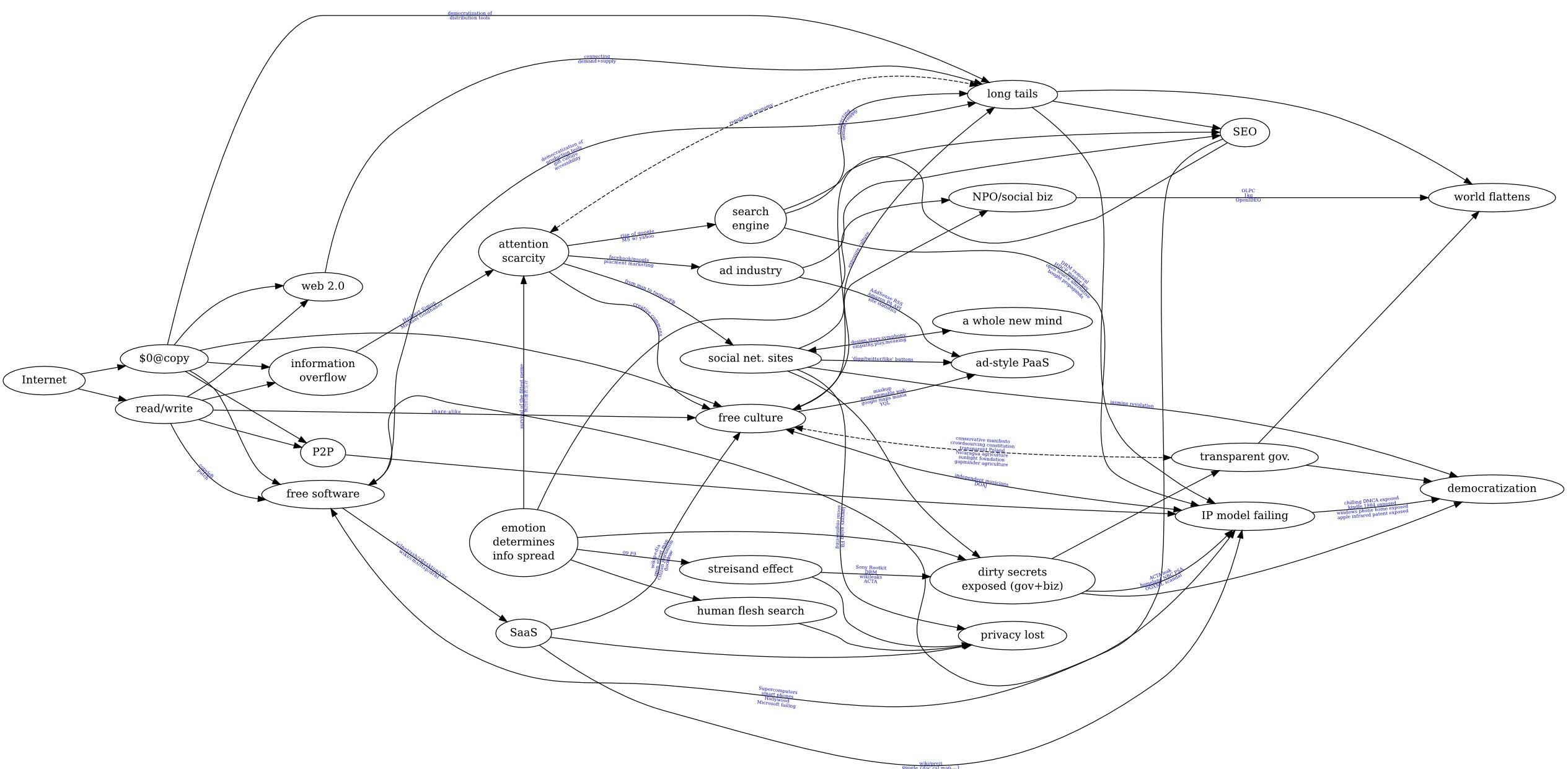Designing Government ICT Strategies that Benefit from the Internet
By HUNG Chao-Kuei on Tuesday, August 23 2011, 20:56 - Permalink
 A national government can choose to design
its ICT strategy to flow along with or against
the forces and phenomena of the Internet.
(See picture "internet phenomenon map"
for details) To give some examples,
a government setting up policies and formulating
regulations may find itself facing dilemma such as:
A national government can choose to design
its ICT strategy to flow along with or against
the forces and phenomena of the Internet.
(See picture "internet phenomenon map"
for details) To give some examples,
a government setting up policies and formulating
regulations may find itself facing dilemma such as:
- government transparency vs national secret
- government transparency vs citizen privacy
- use value (and cultural value) vs sale value [of digital contents]
- freedom of speech vs protection of minors
There can be compromises or even agreeable solutions if non-ICT measures are employed, but in most situations the underlying ICT solution by itself will likely lean towards one direction or the other. In fact it almost always lean towards freeing information. Many failure stories of DRM and censorship provide good examples. Choosing to favor the free flow of information as much as possible in setting up national ICT strategies will more likely put a country on the winning side in the new world of attention economy. The following are some suggestions to achieve this, some non-technology suggestions to ameliorate part of its undesirable effects such as causing loss of privacy, and some other reminders regarding the design of a national ICT policy. regarding the design of a national ICT policy.
- Madating the use of open file formats and open protocols is essential for data to be retained for a long time, for software components to be replaceable with competitive or new alternatives, and for there to be true competition in the market.
- Free/Libre/Open Source Software or their proprietary derivatives (such as Apple's iOS) are the choice of technology in both the top supercomputer market and the mobile market. Only the desktop markets in developed countries are burdened with a legacy choice of platform. Choosing FLOSS or at least mandating a comparison before a proprietary solution is adopted can be an important factor in helping developing countries to leapfrog.
- The knowledge of SEO (search engine optimization) can be a natural incentive for the public (in particular the small businesses owners) to learn the importance of searching and of being visible on the Internet.
- Thinking from users' point of view is more productive than thinking exclusively from digital content (e-books/music/software/...) producers' point of view. Exposing math/physics/chemistry teachers to drgeo, gnuplot, maxima, ghemical, etc., for example, is much more productive than thinking of helping the ICT industry itself making money by way of cloud computing. A society in which the electricity companies make a lot of profits is certainly not a society that greatly benefits from electricity.
- Exposing students to free software and free culture helps future citizens to recognize the power of collaboration, transparency, and ultimately the power of the Internet.
- The debates between network neutrality and deep packet inspection (DPI) lies beneath many other debates.
- The attention economy as explained in Michael Goldhaber's article is the key for scholars and policy makers to understand many social phenomena brought about by the Internet.
- Stanford Law professor Lawrence Lessig's suggestion regarding regulation of spam and porn is not perfect but is a better compromise than no regulation and a far better compromise than DPI. In general, "code is law" is a must-read for law makers (though I don't think many read it, and that's why Internet laws in many countries are badly made).
- Citizens need be educated about the fact that there can hardly be any privacy on the Internet. Privacy might be protected if citizens are consciously thinking about it before they put any personal information on the Internet in the first place.
By the way, the strategy and planning game of lincity (or its modern successor lincity NG) might provide lots of insights for politicians of any country, many of whom can't think far enough into the future. Might a country turn out to be more competitive if it include this game (or some other similar strategy games) in its politics degree curriculum ? :-)
![[rss feed 圖案]](/~ckhung/i/rss.png)